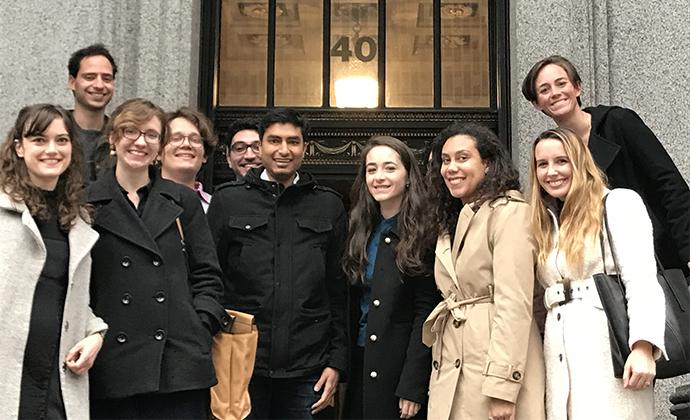Students Play a Role in Securing Environmental Law Victory in Federal Court
Tess Dernbach ’19 and Laura Keeley ’19 drafted an amicus brief on behalf of former Congressman Henry Waxman in an important case against the EPA.
Students in Columbia Law School’s Environmental Law Clinic played a role in securing a major environmental victory when a federal court on Aug. 9 ordered the EPA to ban chlorpyrifos, a toxic pesticide linked to brain damage in children, within 60 days.
Tess Dernbach ’19 and Laura Keeley ’19 drafted an amicus brief on behalf of former U.S. Representative Henry Waxman, an environmental advocate and the primary author of the Food Quality Protection Act of 1996 (FQPA)—a comprehensive overhaul of the nation’s pesticide laws that established a strong health-based standard for pesticide residues in food. The students argued that the EPA’s denial last year of a petition to ban chlorpyrifos exceeds its statutory authority and “runs afoul” of FQPA’s “clear legislative goals.” (Environmental groups and farmworker advocates had been calling for a ban since 2007 when they first petitioned the EPA.) The decision by the U.S. Court of Appeals for the 9th Circuit vacates the EPA's order, which denied the petition and led to the lawsuit.
In its 2-1 ruling, the court found that the EPA offered “no defense” for its decision to delay a ban on chlorpyrifos, a move that the court said violated the Federal Food, Drug and Cosmetic Act. That law governs pesticides and requires the EPA to ban chemicals from being used on food if they are proven to cause harm.
Writing for the majority, Judge Jed S. Rakoff, a Columbia Law adjunct professor, said, “The panel held that there was no justification for the EPA’s decision in its 2017 order to maintain a tolerance for chlorpyrifos in the face of scientific evidence that its residue on food causes neurodevelopmental damage to children.”
The 21-page brief by Keeley and Dernbach details the legislative history of the FQPA and explains that Rep. Waxman and his colleagues in Congress "overcame two decades of Congressional gridlock to overhaul the food pesticide regime and pass the FQPA.”
"We are so grateful for the opportunity to take on this important work," Keeley said, noting that the project is just one of many examples of clinic students taking on real-world challenges and cases.
Under the Obama administration, the EPA had begun working toward a ban on the widely used chemical, following the results of a 2016 agency study that showed exposure to chlorpyrifos posed health risks to fetuses and children, as well as to agricultural workers.
In March of this year, then-EPA chief Scott Pruitt rejected the findings of his own agency and ordered a reversal of the chlorpyrifos ban.
The 9th Circuit decision orders the EPA to revoke all tolerances and cancel all registrations for chlorpyrifos within 60 days. The full opinion is available here.
The Environmental Law Clinic has tackled a vast array of urgent issues since it was first established in 2000 by environmental lawyer and activist Edward Lloyd. Together with Susan Kraham ’92, the clinic's senior staff attorney who recently was named the Law School's new director of externships and field-based learning, students tackle climate change, pipeline infrastructure fracking, industrial agriculture, clean air, “smart growth,” wetlands preservation, and endangered species.
###
Published on August 21, 2018
